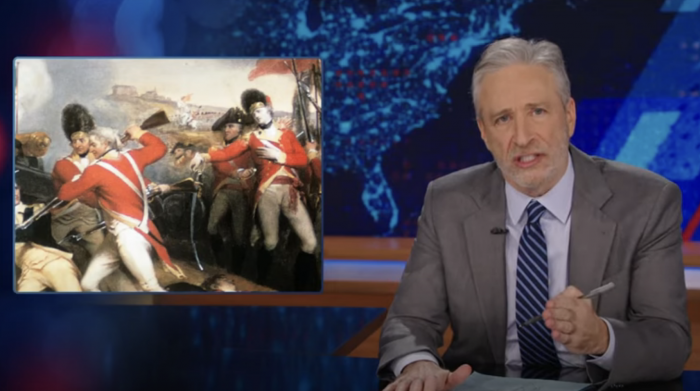
-thumb-260x178-12986.jpg)
It's Not Selling Out; It's Called Politics. And It's an Ugly Business
By Dustin Rowles | Film | August 10, 2010 |
By Dustin Rowles | Film | August 10, 2010 |
Obama’s Deal, the latest Frontline documentary now available on Netflix Watch Instantly, tracks President Obama’s historic passage of his health care bill, focusing on the back room dealings, the compromises, and the setbacks along the way. It doesn’t offer much in the way of new information, and if you followed the healthcare bill debate — or even scanned the New York Times from time to time — there’s not much in the documentary that won’t be familiar to you. Nevertheless, it’s a fascinating doc, not for the details it provides, but for the way it lines up the major events along the way, and allows you to appreciate a lot of the political maneuvering behind the bill’s passage. It also lays out some of the tougher, morally and ethically ambiguous choices that had to be made to get it passed.
The compromising behind the bill involved a lot of selling out, but Obama’s Deal at least demonstrates why selling out was necessary. It’s easy, I think, to maintain a self-righteous, go-for-broke attitude, especially if you swing hard toward the left side of the political spectrum, but 90 percent of the time, that all-or-nothing attitude will usually get you nothing. That’s what Bill and Hillary Clinton learned in the early 1990s, and a mistake that Chief of Staff Rahm Emanuel — who was a minor figure in the ’90s healthcare debate — learned from, applying those lessons to his attempts to pass Obama’s deal. It’s clear, from the documentary, that it was Emanuel’s cut-throat, fuck-you approach to his own party was a huge part of what made passage of the bill possible.
Some of the more interesting parts of the documentary, however, focused on those external factors, largely out of the White House’s control, that ended up becoming a huge factor in the bill’s progression. In this case, it was the death of Ted Kennedy that both propelled the health care bill and that, subsequently, nearly killed it. There was a lot of pressure on Obama to abandon universal healthcare before he’d even got started on it. But under the correct belief that he’d never be more popular than he was at the beginning of his first term, he decided to use his political capitol then. And in cold, political terms, the ailing health of Ted Kennedy — Congress’ champion of healthcare reform — was part of the impetus, in both political terms and out of respect for the Senator. It was Kennedy’s death, in fact, that pushed the Senate to pass the bill, 60 to 39 (also in part because of that horrible, politically toxic deal that Obama had to make for Nebraska Senator Ben Nelson, in which Nebraska was given $100 million in exchange for Nelson’s vote).
But in a horrible, ironic twist, it was Kennedy’s replacement in Massachusetts that nearly killed health care. As many may recall, there was a healthcare bill on the table — passed on Christmas Eve — but it hadn’t yet been passed by the House. In order to get it to the President, the House had to pass the Senate bill because, without the super-majority in the Senate — thanks to the victory of Scott Brown— the President wouldn’t be able to push a compromise bill through the Senate. Healthcare seemed all but dead. But, Emanuel ultimately shoved the Senate bill down Nancy Pelosi’s throat. And thanks to the insurance industry’s adamant opposition to the bill — which gave Obama an unpopular enemy — he was able to force public opinion just enough so that the House eventually passed the bill, 219-212, but not before Obama spent a month on the stump or before Obama threw McCain’s words back in his face during a White House Health Care Summit, in what would become a major political turning point:
What’s nice about Obama’s Deal is the way it highlights all the major events leading up to the passage, stripping away the mindless media chatter that dominated the day-to-day maneuvering. The problem, however, is that part of the reason I decided to watch the documentary was because I’d hope it’d help explain what actually was passed back in March and how it will affect us now and in the future. Unfortunately, there were no answers provided in that regard, so all we’re left with is the knowledge that Obama scored a major political victory. What he won most of us still don’t quite fully understand, and it may be years or decades before we do.
← Reese Witherspoon IS Peggy Lee | ...IN "Peggy Lee: Man of Action" | "True Blood" (S3/E8) Recap | Here Today, Gone Tomorrow →

Jon Stewart Forcefully Makes the Case Against the Former President's Patriotism
Is The Royal Family Trying to Make It Look Like Kate Middleton’s Dead?
What’s Old Is New Again: Old Hollywood Glamour Glitters at the 2024 Oscars
Al Pacino Presents Best Picture Oscar, Confuses Everyone
The Dangerous Lie Of 'TradWives'
A Legendary Horror Franchise Is Headed To Television
More Like This
Al Pacino Presents Best Picture Oscar, Confuses Everyone
Kyle Mooney's Horror-Comedy 'Y2K' Goes Too Hard on Kyle Mooney's Sense of Humor
'Imaginary' Almost Sucks
Box Office Report: Kung Fu Sandworms
The 2024 Oscars Were Great Right Up Until the End
Reviews